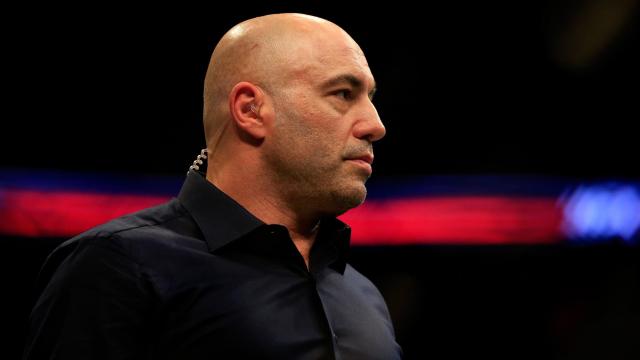Joe Rogan has an important message for Neil Young, Joni Mitchell, and any other major artist that’s removed their music from Spotify’s platform in response to his podcast’s habit of hosting well-known antivaxxers: he’s sorry, but not sorry enough to stop doing it.
That’s arguably the biggest takeaway from a nearly 10 minute clip Rogan posted on his Instagram last night, marking the first time the podcast host has publicly addressed the controversy surrounding his podcast, The Joe Rogan Experience, in recent weeks. Just to recap, the controversies have included: hosting multiple well-known vaccine sceptics on his podcast and then refusing to address the debunked antivax claims that these sceptics circulated on his show. Spotify, which struck an exclusive podcasting deal with Rogan back in 2020 wasn’t stepping in, which led to multiple top-tier musicians — and apparently countless Spotify customers — fleeing the platform en masse.
Rogan’s response, meanwhile, makes the guy seem like he’s shocked — shocked! — that his podcast, which reaches an estimated eleven million listeners per episode — would be taken that seriously at all.
“These podcasts are very strange because they’re just conversations, and oftentimes I have no idea what I’m going to talk about until I sit down and talk to people,” Rogan said in Sunday’s Instagram clip.
“That’s why some of my ideas are not that prepared or fleshed out — because I’m literally having them in real-time. But I do my best, and they’re just conversations […] It’s a strange responsibility to have this many viewers and listeners. It’s very strange and it’s nothing that I prepared for, and it’s nothing that I ever anticipated.”
What Rogan does over and over again throughout the clip is mention “conversations.” This certainly isn’t unique to Rogan, but folks have used phrases like “we were just having conversations,” or “we were just debating,” as an excuse to air out obvious mistruths, despite the fact that spreading misinformation is not debate. And what Rogan has been doing is spreading misinformation, plain and simple.
This included recent interviews with figures like Peter McCullough, a cardiologist who used the podcast to air out absolute nonsense like “vaccines killed thousands of people,” and that there was an “intentional” suppression of early treatment plans for COVID-19. Despite the fact that both these (and other) claims McCullough made are blatantly false, Rogan hosted them on his absurdly huge platform, lending an air of legitimacy to these frankly dangerous ideas.
Rogan’s episode with McCullough was flanked by another with the widely criticised vaccine sceptic Robert Malone, who used the interview as a chance to compare COVID vaccination efforts to the Nazi party’s rise to power, despite the fact that those two concepts aren’t similar in the slightest. In his meek defence, Rogan noted in his Instagram clip that these doctors merely “had an opinion that was different from the mainstream narrative,” and that he “wanted to hear what their opinion is.”
“I don’t know if they’re right, because I’m not a doctor, I’m not a scientist,” Rogan said. “I’m just a person who sits down and talks to people and has conversations with them.” Sure dude.
Despite the fact that these guests were obviously spewing obviously incorrect statements, Rogan bristled at using the word “misinformation” to describe the two interviews. He pointed out that the “problem” he had with the term in the coronavirus era is that much of what we’re hearing from federal officials seems to flip-flop at a frustratingly regular pace. And while yes, the CDC could get its act together, the Centre’s always been pretty consistent about a few key points. Masks work. Social distancing works. And getting a dang vaccine is always a better choice than getting infected by a potentially life-threatening virus.
Rogan, for his part, didn’t say that he’d stop having controversial guests on to have “conversations” about these topics, though he did note that he would “try hard” to get those with more mainstream views on in the following episodes. He was also quick to thank Spotify for “being so supportive” during the backlash against his podcast.
The same day that Rogan put out his faux apology on Instagram, the Swedish audio giant — whose shares had tanked in response to some of its biggest stars leaving — issued something of a faux apology of its own. The company noted that these episodes and others dealing with potential COVID-19 misinformation will have a new content advisory that will play beforehand. As of Monday, these advisories still aren’t on either of the aforementioned Joe Rogan Experience episodes, despite the fact that the episodes are still there, and still being listened to, by countless adoring fans.
